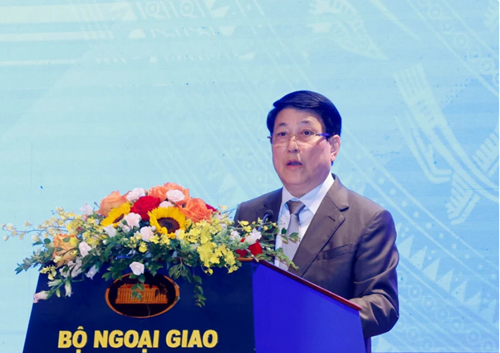The State President made the remarks while addressing an international seminar in Hanoi on April 23, which spotlighted the significance of the historical victory in the resistance against the U.S. imperialists to liberate the South and reunify the nation 50 years ago, and the constructive role played by the nation’s diplomacy in the past and at present.
Vietnam’s diplomacy successfully gathered immense material and spiritual support from socialist countries and progressive people worldwide, creating an unprecedented international movement to support Vietnam’s just struggle, he said, noting that in the 20th century, there are few struggles in the world have received such widespread and strong support both at home and abroad as Vietnam’s.
    |
 |
|
State President Luong Cuong speaks at the international seminar in Hanoi on April 23. |
According to the President, every country, regardless of its size, experiences historic turning points - critical junctures that shape its destiny and development path. For Vietnam, the victory on April 30, 1975, was a profoundly significant event in the nation's history. From that moment, Vietnam was fully reunified, and the nation entered a new historical era - the era of independence, unification, and socialism building.
Highlighting the significant contribution of Vietnam's diplomacy to that historic victory, the President emphasized that, even after half a century, the historical significance and profound lessons from the triumph remain fully relevant and carry national and era-defining value, helping guide Vietnam’s diplomatic efforts in peacebuilding, and national defense and construction.
After the Politburo issued a resolution in 1969 stating that diplomacy becomes an important front carrying strategic significance, the diplomacy work became a crucial tool in garnering international support and spreading the just cause of the Vietnamese people’s struggle to the world, he said.
The vision and clear mindset of the Communist Party of Vietnam in foreign affairs aligned well with the international context at that time, the President said, noting that the rise of revolutionary movements - particularly struggles for national liberation and international workers' movement - along with the support of progressive people around the world, created essential conditions for Vietnam’s diplomacy to combine the national strength with the strength of the times in the struggle to liberate the South and reunify the country.
The diplomacy sector worked closely with the military and political fronts, opening up the strategic posture of "fighting while negotiating," therefore gaining step-by-step victories, and laying a foundation for the ultimate triumph in the struggle for the liberation of the South and national reunification, he said.
Notably, the intense battles of wits at the negotiating tables of the 1954 Geneva Conference and especially the Paris Peace Conference (1968-1973) marked the peak of Vietnam’s diplomatic success in the Ho Chi Minh era, the President stressed.
He also highlighted the vital of diplomacy in reconstructing the country and successfully implementing the foreign policy of the Doi moi (renewal) period, especially significant and historic contributions to the nation’s development.
Accordingly, from a war-torn and underdeveloped nation, Vietnam is now among the top 35 economies by GDP and ranks in the top 20 in global trade. The country now maintains diplomatic ties with 194 nations, including 34 comprehensive strategic, strategic or comprehensive partners, including all permanent members of the U.N. Security Council, all G7 members, 18 out of the G20 economies, and all ASEAN countries.
Amidst historic and transformative global changes, President Luong Cuong affirmed that Vietnam fully recognizes its future and destiny are closely tied to peace, stability, cooperation, and development in the region and the world.
He expressed his hope that the seminar would help offer practical directions for Vietnam to work with the international community in fostering and sustaining lasting peace in the region and the world.
At the seminar, experts, historians, and scholars from Vietnam and abroad shared insights and lessons related to the Party’s leadership in the victory of the 1975 Spring General Offensive and Uprising; diplomacy’s role in ending the war and achieving national reunification; and lessons learned from diplomacy during the resistance war against the U.S. imperialists for current foreign affairs. They also highlighted the pioneering role of diplomacy in securing a peaceful, stable, and prosperous environment, and in enhancing Vietnam’s international position in the new era.
Source: VNA